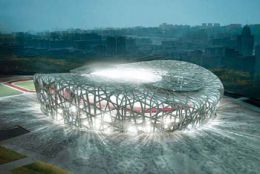Difference between revisions of "National Stadium"
imported>Ciic |
imported>Ciic |
||
| Line 12: | Line 12: | ||
It was built with 36 km of unwrapped steel, with a combined weight of 45,000 tonnes. The stadium has some 11,000 square metres of underground rooms with waterproof walls. | It was built with 36 km of unwrapped steel, with a combined weight of 45,000 tonnes. The stadium has some 11,000 square metres of underground rooms with waterproof walls. | ||
| − | [[Category:Sports venues | + | [[Category:Sports venues]][[Category: National stadiums]] | [[category:Venues of the 2008 Summer Olympics]][[Category:architecture]] |
Revision as of 04:02, 4 September 2012
The National Stadium, as the main track and field stadium for the Beijing 2008 Olympics, is dubbed the Bird's Nest (鸟巢) because of its innovative grid formation.
The twig-like structural elements and the bowl-shaped roof are the masterpiece of the project, yet they pose great challenges for technicians and workers to make the building stand on its own feet.
The stadium can seat as many as 91,000 spectators during the Olympics. It is located right next to the Beijing National Aquatics Center.
In 2002, Government officials engaged architects worldwide in a design competition. Pritzker Prize-winning architects Herzog & de Meuron collaborated with ArupSport and China Architecture Design & Research Group to win the competition. Contemporary Chinese artist, Ai Weiwei, is the Artistic Consultant for design.
The ground was broken on Christmas Eve December 2003, and construction started in March 2004.
It was built with 36 km of unwrapped steel, with a combined weight of 45,000 tonnes. The stadium has some 11,000 square metres of underground rooms with waterproof walls. |
